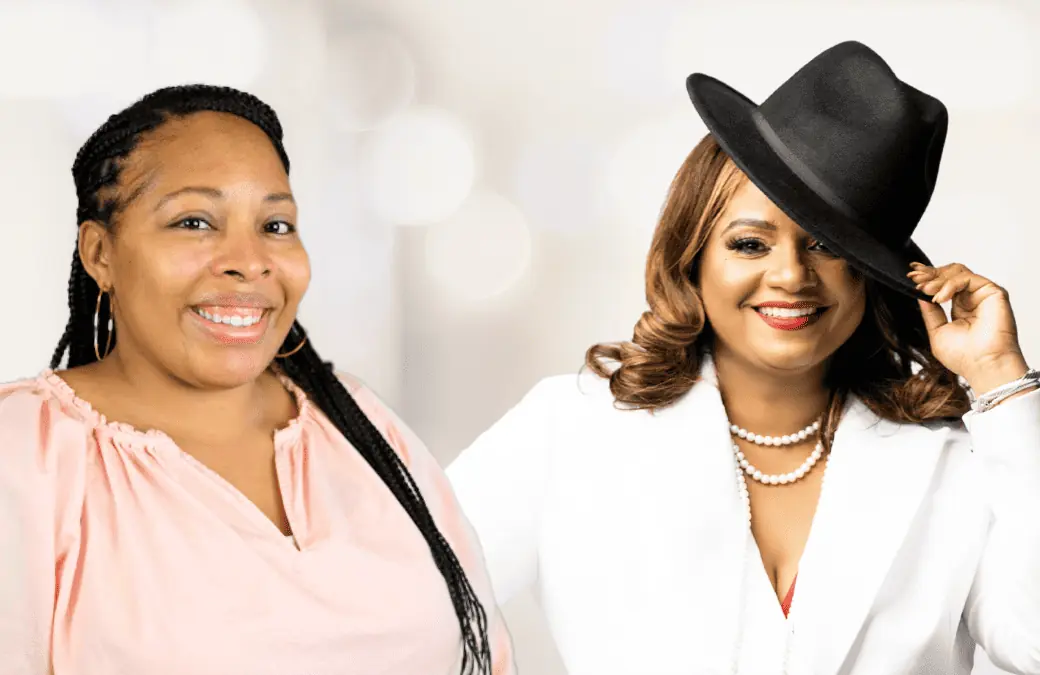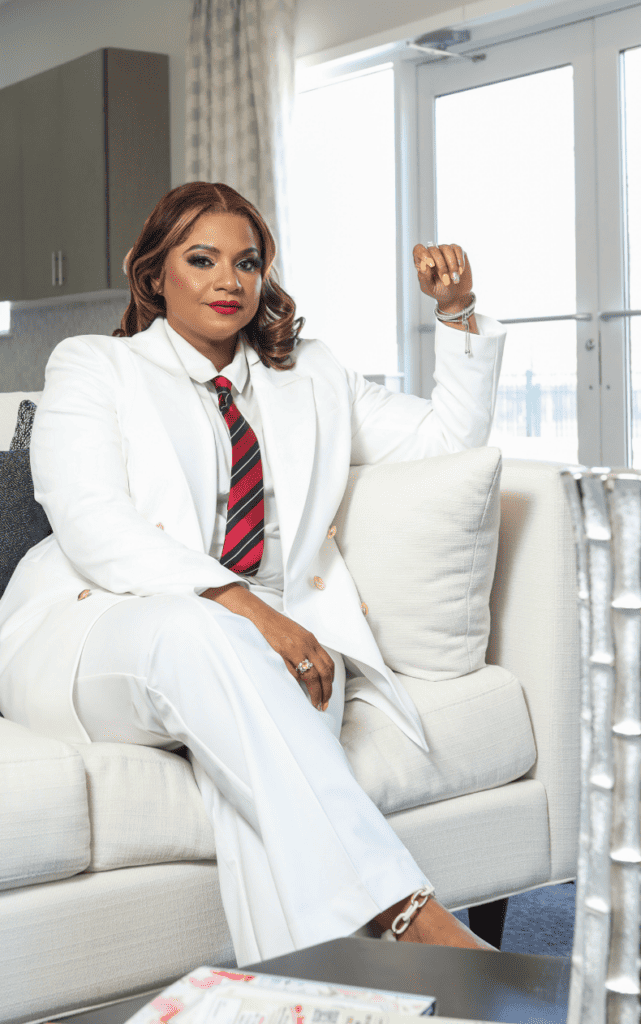Most therapists spend their days thinking about relationships. The relationships of their patients, the relationships of their employees, and perhaps their personal relationships with family and friends. But one of the most important relationships of a private practice owner is their relationship with money.
When private practice owners and other entrepreneurs reach a higher level of income, they sometimes experience an unexpected fear, one they never dreamed would accompany a higher level of financial success. These now successful business owners struggle to let go of the fear of not having enough.
LaQueshia Clemons, a Licensed Clinical Social Worker (LCSW) and Accredited Financial Counselor (AFC®) specializes in helping entrepreneurs and others improve their relationship with money. As a financial therapist, LaQueshia not only helps people get control of their money, but she also helps them transform their money mindset.
LaQueshia’s clients share several issues with many others who are emotionally challenged by finances, but these beliefs affect women in unique ways:
- “My money is a mess.”
- · “I don’t know what I’m doing.”
- · “I don’t have enough money.”
- · “Money is always disappearing somewhere, and I don’t know why.”· “Yes, I know I have debt, but I can’t bear to think about it or look at it.”
In women, this anxiety over finances has become so extreme and so pervasive that it has earned its own name—“Bag Lady Syndrome.” This fear of ending up penniless, hungry, and living on the street is found in women of all ages and all incomes. Even billionaire Oprah Winfrey has admitted to having “Bag Lady Syndrome.”
The fact that Oprah worries about money shows just how much mindset can twist our overall perception of our finances. Your finances may be in wonderful shape, but if your perception about them is skewed, you can emotionally hobble yourself into an unnecessarily painful life.
Change Your Mindset First

When people attempt to change their financial reality, they usually try an action-based approach. They assess their total assets, total debt, monthly income versus monthly expenses—all the numbers that most financial experts mention. These figures are important, but changing these won’t alter your emotions around money. If your emotions don’t change, any other changes you make may not be lasting.
LaQueshia creates a one-on-one framework that examines mindset before ever looking at the numbers of a client’s bank account. Her counseling begins by covering some of the core issues they carry about finances:
· What are your limiting beliefs about money? Did someone tell you that you weren’t any good at handling money? How did your parents or family members speak about money when you were growing up?
· How do you think about money now? What feelings come up when you get paid? Who is around you and how do they contribute to how you manage money?
· What are you spending your money on and why?
· How does money affect your relationships? Do you have a fear of sharing or not sharing expenses or making joint decisions?
Actions for Moving Your Money Mindset
Once you’re able to identify your limiting beliefs and emotions about money, it’s time to get some traction by taking action. Here are a few suggestions for moving your money mindset needle forward:
- Compose a “dear money” letter: write a letter to money as if they were a person. Let it know how you feel when it deserts you, how it has disappointed you, how it felt to chase it. Write about all the emotions you’ve felt about money and all the emotions you would like to feel in the future.
- Write about what would happen if money expired. If you could only keep money for a certain amount of time, would you change your behavior around money?
- Track income and expenses each week in a spreadsheet while writing what is coming up emotionally as you record each expense.
Money mindset is all about behaviors, attitudes, and emotions. Once a client is on the path to improving their thoughts around money, only then is a spending and budgeting plan put in place.
LaQueshia’s Story

The story of LaQueshia’s journey is inspirational not just because of the extraordinary success in her life, but because she started from a point where so many people find themselves—deep in debt with no obvious way out.
After turning 18, she couldn’t wait to get her first credit card. That first card started her habit of swiping and buying, a habit that expanded after getting more credit cards. She was told that buying on credit and paying the minimum balance was good for her credit rating.
Her troubles and spending increased while she was in college. She didn’t realize the danger of interest rates and how her spending influenced her payments. Eventually every dollar she earned was going towards making the minimum payments.
Reality finally arrived on the day she couldn’t make two of those minimum payments. That’s when she knew she was in trouble, and the only person who could help her was herself.
After hours of Google research, she found exactly what she needed—the website of Dr. Brad Klontz. Dr. Klontz’s theories and his explanations of how our beliefs form our psychology of money hit home with LaQueshia. She recognized how her childhood environment had affected how she handled money.
Even her training as a social worker didn’t help. As a social worker, she learned how to provide resources, such as food stamps and section-8 housing, but there was no counseling on how to liberate oneself from those resources and build independence.
She educated herself by reading numerous books and eventually hired a financial coach to assist her in understanding budgeting and financial knowledge.
Along with her LCSW certification, LaQueshia became an Accredited Financial Counselor. Becoming financially stable, savvy, and successful was not only a goal she accomplished in her life, but it’s now a skillset that she is passing on to others.
Jane’s Success Story
Jane contacted LaQueshia because she was afraid of looking at her financial situation. A business owner and entrepreneur, Jane’s fluctuating income caused a lot of anxiety and worry about the future. She was so worried that she would only look at her books after her bookkeeper pleaded with her.
Her money story was formed from painful childhood experiences. Her stepfather’s death was followed by her mother going through a major depression. Her mother became a hoarder who spent money on things instead of dealing with the grief of losing her husband.
Throughout high school, Jane tried to take care of herself. She was able to go to college but once there, she received a huge culture shock. She grew up in New York, living around mostly black and brown people, and never thought about race or discrimination. In college she realized how much she didn’t have and became very aware that she was poorer than the other students. The discrepancy was so painful that it caused her to drop out.
Jane felt as if she never had enough—not enough money and not enough of the things that other people had. Her intimate relationships suffered because of money. She also incurred lots of debt because of spending. Her spending was a source of pain but also a source of comfort.
Jane’s work with LaQueshia started with small but effective steps. Her first goal was to discipline herself to only purchase what was on her shopping list. Her next task was to write a letter to money, speaking to money as if it were a person—letting money know how it had let her down.
She’s now working on her PhD. These days Jane initiates meetings with her bookkeeper and feels as if she is in control of her money, instead of her reactions to money controlling her.
Anne’s Success Story
Anne’s money issues were created by a sudden increase in income. Anne had been working three jobs, making 30-40K per year, and struggled to pay all her bills. She lived very frugally, scrimping and saving as much as possible.
When she landed a great position with a yearly salary of 150K, she was ecstatic about the much larger paycheck but was frightened that it would disappear. That’s when she began to work with LaQueshia. Her plethora of “what ifs” were holding her back from taking effective steps with her money.
She had saved 40K because she was accustomed to saving any money at the end of the month, but she struggled to make decisions about how much to pay for everyday items, like groceries or other living expenses.
She yearned to get rid of those dreadful “what ifs” and achieve some new goals. She wanted to travel and visit friends as well as buy certain items without guilt.
LaQueshia helped her develop confidence in her money decisions and how to budget for her new life. Since then, Anne has traveled for a month in Europe, working remotely while traveling. She’s also begun to invest the large sums she’s saved.
Money Mindset for Mental Health Workers
Many mental health workers share money concepts that limit their earning power. This lack of financial health in mental health professionals is so common that it’s been the subject of articles in peer-reviewed journals.
In the article “Financial Health of Mental Health Professionals” published in the Journal of Financial Therapy, Dr. Klontz and his associates stated, “many people in this field have chosen their careers because they have more of an affinity for emotional, intuitive work than they do for numbers and bookkeeping….education for these professionals rarely includes training in managing a practice in a businesslike and financially sound manner.”
LaQueshia’s mission is to change that disempowering self-talk and all the limiting behaviors that accompany it. To begin to change the money mindset of mental health workers, she asks:
- What is holding you back from taking the next step in your financial life?
- Why is the narrative that therapists don’t make any money guiding your life?
- Why are you accepting that therapists are low-paid professionals?
- Why do you think the best bet for employment in mental health is to get a state job?
LaQueshia concludes, “We must debunk the stereotype. We have so much power to do so much good in the world. Think outside the box. You can help people and still make money, but you must first tackle the limiting beliefs.
“Once you realize what money is, you change your belief about it. Money is just a resource. It’s more than simply something to budget, but it’s also nothing to fear. When you understand the connection you have with money, you don’t let it run your life. You run money instead.”LaQueshia is currently offering financial counseling for individuals and groups, speaking engagements, plus journals and other resources. To connect with LaQueshia, reach out to her at https://www.freedomlifetherapy.com/services.








